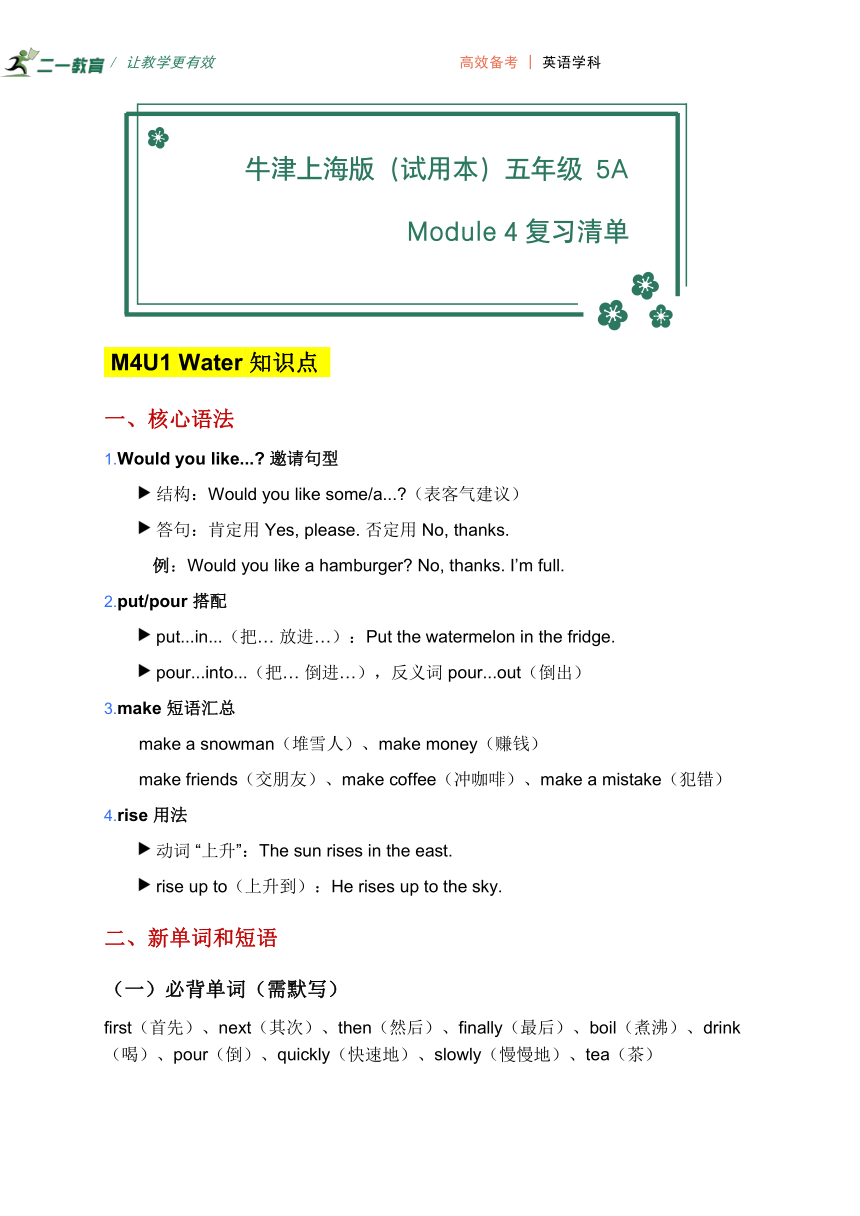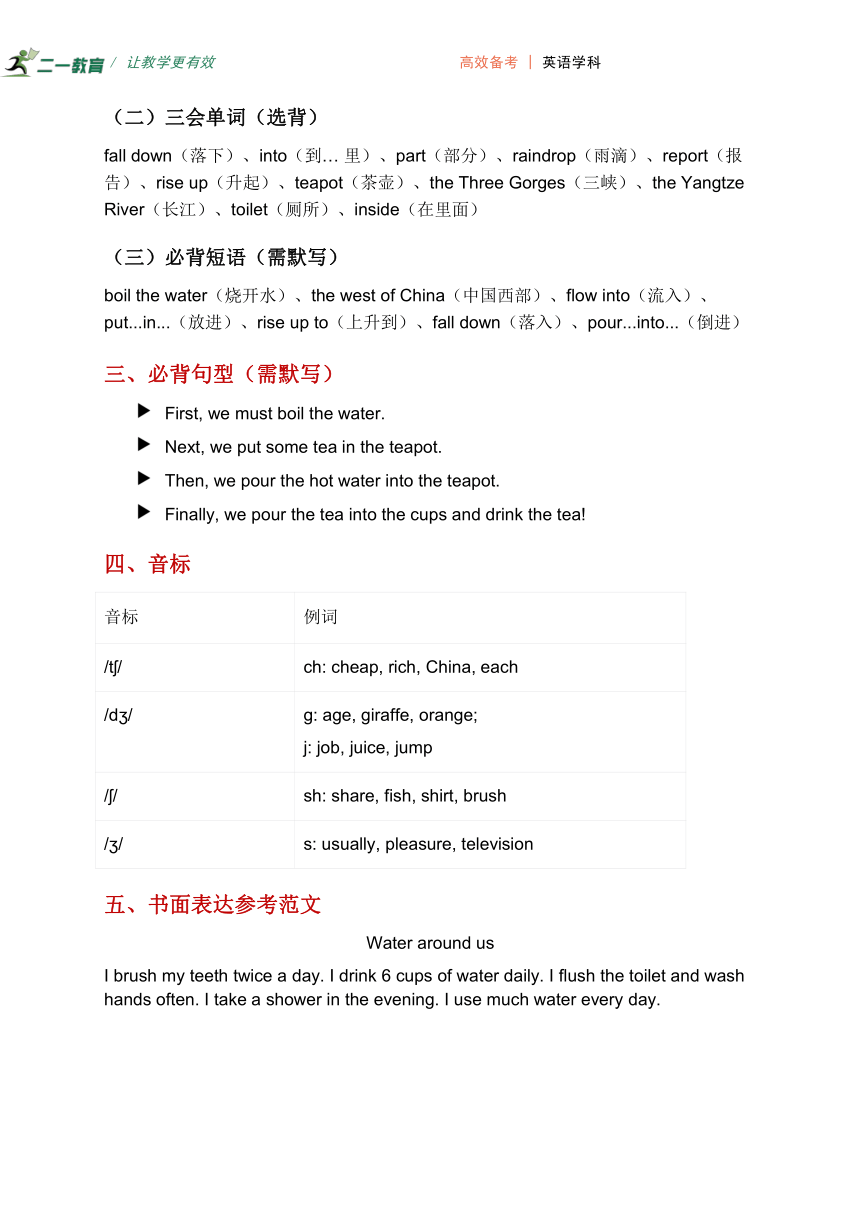小学英语牛津上海版(试用本)五年级上册Module 4 The natural world 复习清单
文档属性
| 名称 | 小学英语牛津上海版(试用本)五年级上册Module 4 The natural world 复习清单 |

|
|
| 格式 | docx | ||
| 文件大小 | 416.6KB | ||
| 资源类型 | 试卷 | ||
| 版本资源 | 牛津上海版(试用本) | ||
| 科目 | 英语 | ||
| 更新时间 | 2025-06-05 11:16:36 | ||
图片预览


文档简介
/ 让教学更有效 高效备考 | 英语学科
M4U1 Water 知识点
一、核心语法
1.Would you like... 邀请句型
结构:Would you like some/a... (表客气建议)
答句:肯定用 Yes, please. 否定用 No, thanks.
例:Would you like a hamburger No, thanks. I’m full.
2.put/pour 搭配
put...in...(把… 放进…):Put the watermelon in the fridge.
pour...into...(把… 倒进…),反义词 pour...out(倒出)
3.make 短语汇总
make a snowman(堆雪人)、make money(赚钱)
make friends(交朋友)、make coffee(冲咖啡)、make a mistake(犯错)
4.rise 用法
动词 “上升”:The sun rises in the east.
rise up to(上升到):He rises up to the sky.
二、新单词和短语
(一)必背单词(需默写)
first(首先)、next(其次)、then(然后)、finally(最后)、boil(煮沸)、drink(喝)、pour(倒)、quickly(快速地)、slowly(慢慢地)、tea(茶)
(二)三会单词(选背)
fall down(落下)、into(到… 里)、part(部分)、raindrop(雨滴)、report(报告)、rise up(升起)、teapot(茶壶)、the Three Gorges(三峡)、the Yangtze River(长江)、toilet(厕所)、inside(在里面)
(三)必背短语(需默写)
boil the water(烧开水)、the west of China(中国西部)、flow into(流入)、put...in...(放进)、rise up to(上升到)、fall down(落入)、pour...into...(倒进)
三、必背句型(需默写)
First, we must boil the water.
Next, we put some tea in the teapot.
Then, we pour the hot water into the teapot.
Finally, we pour the tea into the cups and drink the tea!
四、音标
音标
例词
/t /
ch: cheap, rich, China, each
/d /
g: age, giraffe, orange; j: job, juice, jump
/ /
sh: share, fish, shirt, brush
/ /
s: usually, pleasure, television
五、书面表达参考范文
Water around us
I brush my teeth twice a day. I drink 6 cups of water daily. I flush the toilet and wash hands often. I take a shower in the evening. I use much water every day.
M4U2 Wind 知识点
一、核心语法
1.-ly 副词用法
构成:形容词 + ly(如 gentle→gently),少数变 y 为 i+ly(heavy→heavily)
作用:修饰动词(The wind blows gently.)
特例:heavy(形)→heavily(副)表 “雨大”:It's raining heavily.
2.will 将来时
结构:will + 动词原形 /be 动词
例:I will be eleven next year.
3.be made of 材质表达
例:It is made of wood. These boats are made of paper.
4.I'm afraid... 委婉表达
例:I'm afraid you can't.(恐怕你不能。)
二、新单词和短语
(一)必背单词(需默写)
gently(轻轻地)、strongly(猛烈地)、slowly(慢慢地)、quickly(迅速地)、blow(吹)、happily(高兴地)
(二)三会单词(选背)
heavily(剧烈地)、heavy(猛烈的)、hope(希望)、(be) made of(由… 组成)、softly(轻柔地)、wind-bell(风铃)、wood(木头)、windmill(风车)、tomorrow(明天)
(三)必背短语(需默写)
look out of(看… 外面)、go out(出去)、the sound of...(… 的声音)
三、必背句型(需默写)
The wind blows gently.
The windmill is moving slowly.
The flowers are dancing in the wind softly.
四、音标
音标
例词
/tr/
tr: tree, try, train, trunk
/dr/
dr: dress, dry, drink, draw
五、书面表达参考范文
A windy day
It’s a windy day. The wind blows strongly. Flowers dance in the wind. The windmill moves quickly. Children fly kites happily in the park.
M4U3 Fire 知识点
一、核心语法
1. must 情态动词
肯定:must + 动词原形(You must put rubbish in the bin.)
否定:mustn’t = must not(You mustn’t play with matches.)
2.talk about /tell...about 用法
talk about(谈论):Miss Yang talks about the outing.
tell...about(告诉):Kitty tells us about her family.
3.否定祈使句
结构:Don’t + 动词原形(Don’t smoke!)
4.must be + 形容词
例:People must be careful. You must be early.
5.start 多义
发生:The fire starts.
生(火):start a campfire
二、新单词和短语
(一)必背单词(需默写)
smoke(吸烟)、campfire(篝火)、careful(小心的)、match(火柴)、safety(安全)、start(发生 / 生火)
(二)三会单词(选背)
bravely(勇敢地)、burn(燃烧)、country(乡下)、die down(熄灭)、luckily(幸运地)、the Stone Age(石器时代)、cover(盖住)、helicopter(直升机)、raw(生的)、sign(标牌)、throw...away(扔掉)
(三)必背短语(需默写)
talk about(谈论)、play with matches(玩火柴)、die down(熄灭)、the Stone Age(石器时代)、live in a cave(住在山洞里)、throw away(扔掉)
三、必背句型(需默写)
At home, we mustn’t play with matches.
Don’t smoke!
Don’t start campfires!
Don't play near fires!
People mustn’t smoke.
Children mustn’t play near fires.
People must be careful.
四、范文
Fire Safety
Fires can start in forests, schools and homes. We must listen to firefighters. Don’t smoke in forests or start campfires. Never play near fires or with matches. Fire is dangerous—be careful!
M4U1 Water 知识点
一、核心语法
1.Would you like... 邀请句型
结构:Would you like some/a... (表客气建议)
答句:肯定用 Yes, please. 否定用 No, thanks.
例:Would you like a hamburger No, thanks. I’m full.
2.put/pour 搭配
put...in...(把… 放进…):Put the watermelon in the fridge.
pour...into...(把… 倒进…),反义词 pour...out(倒出)
3.make 短语汇总
make a snowman(堆雪人)、make money(赚钱)
make friends(交朋友)、make coffee(冲咖啡)、make a mistake(犯错)
4.rise 用法
动词 “上升”:The sun rises in the east.
rise up to(上升到):He rises up to the sky.
二、新单词和短语
(一)必背单词(需默写)
first(首先)、next(其次)、then(然后)、finally(最后)、boil(煮沸)、drink(喝)、pour(倒)、quickly(快速地)、slowly(慢慢地)、tea(茶)
(二)三会单词(选背)
fall down(落下)、into(到… 里)、part(部分)、raindrop(雨滴)、report(报告)、rise up(升起)、teapot(茶壶)、the Three Gorges(三峡)、the Yangtze River(长江)、toilet(厕所)、inside(在里面)
(三)必背短语(需默写)
boil the water(烧开水)、the west of China(中国西部)、flow into(流入)、put...in...(放进)、rise up to(上升到)、fall down(落入)、pour...into...(倒进)
三、必背句型(需默写)
First, we must boil the water.
Next, we put some tea in the teapot.
Then, we pour the hot water into the teapot.
Finally, we pour the tea into the cups and drink the tea!
四、音标
音标
例词
/t /
ch: cheap, rich, China, each
/d /
g: age, giraffe, orange; j: job, juice, jump
/ /
sh: share, fish, shirt, brush
/ /
s: usually, pleasure, television
五、书面表达参考范文
Water around us
I brush my teeth twice a day. I drink 6 cups of water daily. I flush the toilet and wash hands often. I take a shower in the evening. I use much water every day.
M4U2 Wind 知识点
一、核心语法
1.-ly 副词用法
构成:形容词 + ly(如 gentle→gently),少数变 y 为 i+ly(heavy→heavily)
作用:修饰动词(The wind blows gently.)
特例:heavy(形)→heavily(副)表 “雨大”:It's raining heavily.
2.will 将来时
结构:will + 动词原形 /be 动词
例:I will be eleven next year.
3.be made of 材质表达
例:It is made of wood. These boats are made of paper.
4.I'm afraid... 委婉表达
例:I'm afraid you can't.(恐怕你不能。)
二、新单词和短语
(一)必背单词(需默写)
gently(轻轻地)、strongly(猛烈地)、slowly(慢慢地)、quickly(迅速地)、blow(吹)、happily(高兴地)
(二)三会单词(选背)
heavily(剧烈地)、heavy(猛烈的)、hope(希望)、(be) made of(由… 组成)、softly(轻柔地)、wind-bell(风铃)、wood(木头)、windmill(风车)、tomorrow(明天)
(三)必背短语(需默写)
look out of(看… 外面)、go out(出去)、the sound of...(… 的声音)
三、必背句型(需默写)
The wind blows gently.
The windmill is moving slowly.
The flowers are dancing in the wind softly.
四、音标
音标
例词
/tr/
tr: tree, try, train, trunk
/dr/
dr: dress, dry, drink, draw
五、书面表达参考范文
A windy day
It’s a windy day. The wind blows strongly. Flowers dance in the wind. The windmill moves quickly. Children fly kites happily in the park.
M4U3 Fire 知识点
一、核心语法
1. must 情态动词
肯定:must + 动词原形(You must put rubbish in the bin.)
否定:mustn’t = must not(You mustn’t play with matches.)
2.talk about /tell...about 用法
talk about(谈论):Miss Yang talks about the outing.
tell...about(告诉):Kitty tells us about her family.
3.否定祈使句
结构:Don’t + 动词原形(Don’t smoke!)
4.must be + 形容词
例:People must be careful. You must be early.
5.start 多义
发生:The fire starts.
生(火):start a campfire
二、新单词和短语
(一)必背单词(需默写)
smoke(吸烟)、campfire(篝火)、careful(小心的)、match(火柴)、safety(安全)、start(发生 / 生火)
(二)三会单词(选背)
bravely(勇敢地)、burn(燃烧)、country(乡下)、die down(熄灭)、luckily(幸运地)、the Stone Age(石器时代)、cover(盖住)、helicopter(直升机)、raw(生的)、sign(标牌)、throw...away(扔掉)
(三)必背短语(需默写)
talk about(谈论)、play with matches(玩火柴)、die down(熄灭)、the Stone Age(石器时代)、live in a cave(住在山洞里)、throw away(扔掉)
三、必背句型(需默写)
At home, we mustn’t play with matches.
Don’t smoke!
Don’t start campfires!
Don't play near fires!
People mustn’t smoke.
Children mustn’t play near fires.
People must be careful.
四、范文
Fire Safety
Fires can start in forests, schools and homes. We must listen to firefighters. Don’t smoke in forests or start campfires. Never play near fires or with matches. Fire is dangerous—be careful!
同课章节目录
- Module 1 Getting to know you
- Unit 1 My birthday
- Unit 2 My way to school
- Unit 3 My future
- Module 2 Me, my family and friends
- Unit 1 Grandparents
- Unit 2 Friends
- Unit 3 Moving home
- Module 3 Places and activities
- Unit 1 Around the city
- Unit 2 Buying new clothes
- Unit 3 Seeing the docto
- Module 4 The natural world
- Unit 1 Wate
- Unit 2 Wind
- Unit 3 Fire
